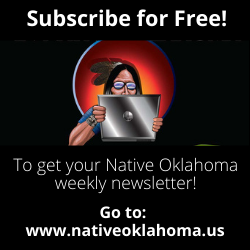

Cherokee chief questions Stitt’s message with Native American Family Day
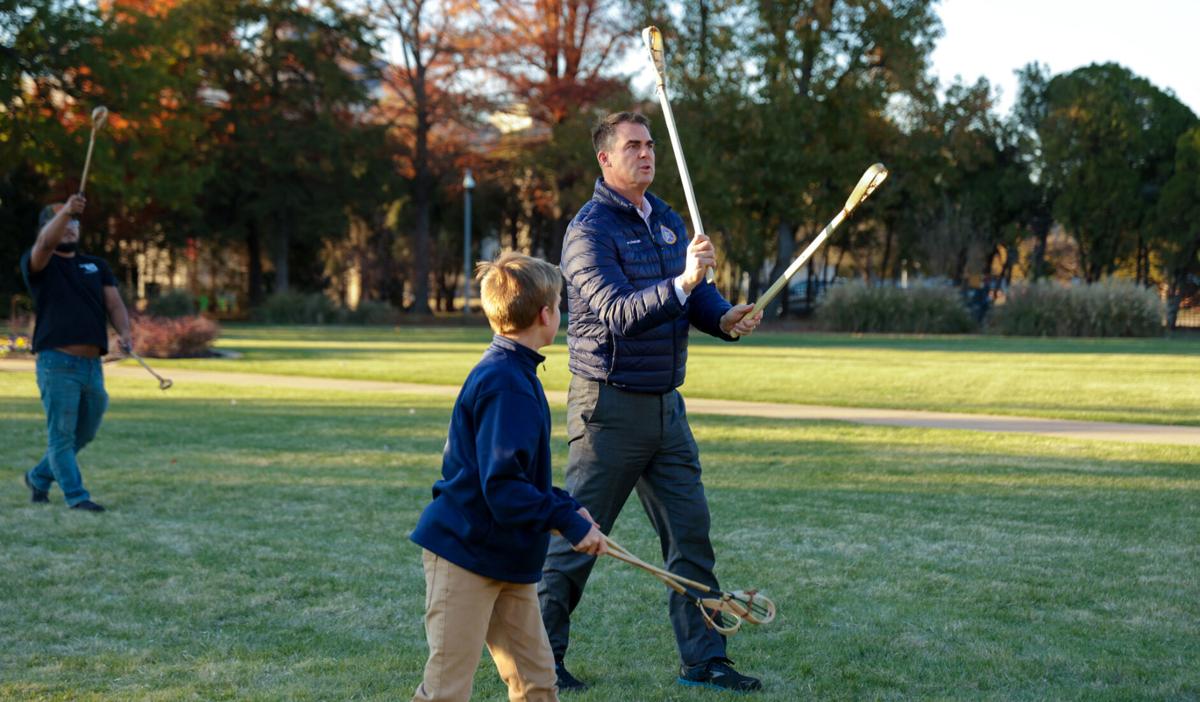
by Felix Clary - Tulsa World
TAHLEQUAH — After Gov. Kevin Stitt celebrated his proclaimed Native American Family Day at his Oklahoma City mansion Tuesday, the Cherokee Nation chief called the event “an afterthought” and a missed opportunity to mend tribal relations.
“Gov. Stitt’s gathering strikes me as the kind of empty afterthought that he has used when he’s tried to make overtures to tribes,” Cherokee Nation Principal Chief Chuck Hoskin Jr. said in a Tulsa World interview Thursday. “I think that it wasn’t a meaningful event.
“I think the fact that he excluded the major tribes of this state, by population, shows that it was an afterthought. Perhaps he was trying to send a message to us with a disinvite.”
Although approximately 60 community members with Cherokee, Choctaw and Chickasaw backgrounds attended, none of the leaders of those tribes was told about the event.
“It’s not necessarily that the tribal leaders were not invited, but we invited people from the tribal communities who don’t get the opportunity to do that all the time,” Stitt spokeswoman Abegail Cave said Thursday.
Stitt has had a strained relationship with tribal nations in Oklahoma, stemming from his first year in office with disputes over tribal gaming. More recently, the governor has made waves over state compacts related to traffic tickets for Native citizens with tribal license plates.
Cave said the Cherokee, Chickasaw and Choctaw tribal leaders have an open invitation to the governor’s home.
“They have his phone number and can call him anytime,” she said.
The tribal leaders weren’t excluded from the event, Cave said, which she characterized as “a quieter one.”
“We tried to get a good mix of people from multiple tribes that would think it’s exciting to be invited to the governor’s home,” she said.
According to Cave, Choogie Kingfisher, a Cherokee citizen from Tahlequah who has been a storyteller for more than 40 years, was invited to the event.
Kingfisher was quoted in Oklahoma Voice coverage of the event: “(It’s) just a wonderful opportunity and makes me feel good that here we are (outside) the governor’s mansion and sharing this cultural day as we’re drawing to a close of a Native American month.”
Hoskin was in Tahlequah on Thursday to sign a revenue-sharing agreement with the city regarding traffic tickets given to tribal citizens within the city limits. When asked about the Native American Family Day proclamation, Hoskin said Stitt ought to have been “celebrating throughout the month.”
“There was an entire month to celebrate Native American heritage in this state, and if there’s any place on this planet where there ought to be a celebration, crossing geographic lines, crossing party lines, crossing racial lines, it ought to be the state of Oklahoma, which was created on top of tribal nations. …
“That didn’t happen this month,” Hoskin said of the governor’s efforts. “It’s not at all a surprise.”

Chief Hoskin, Deputy Chief Warner propose ‘Gadugi Corps’ Program legislation for volunteer and national service
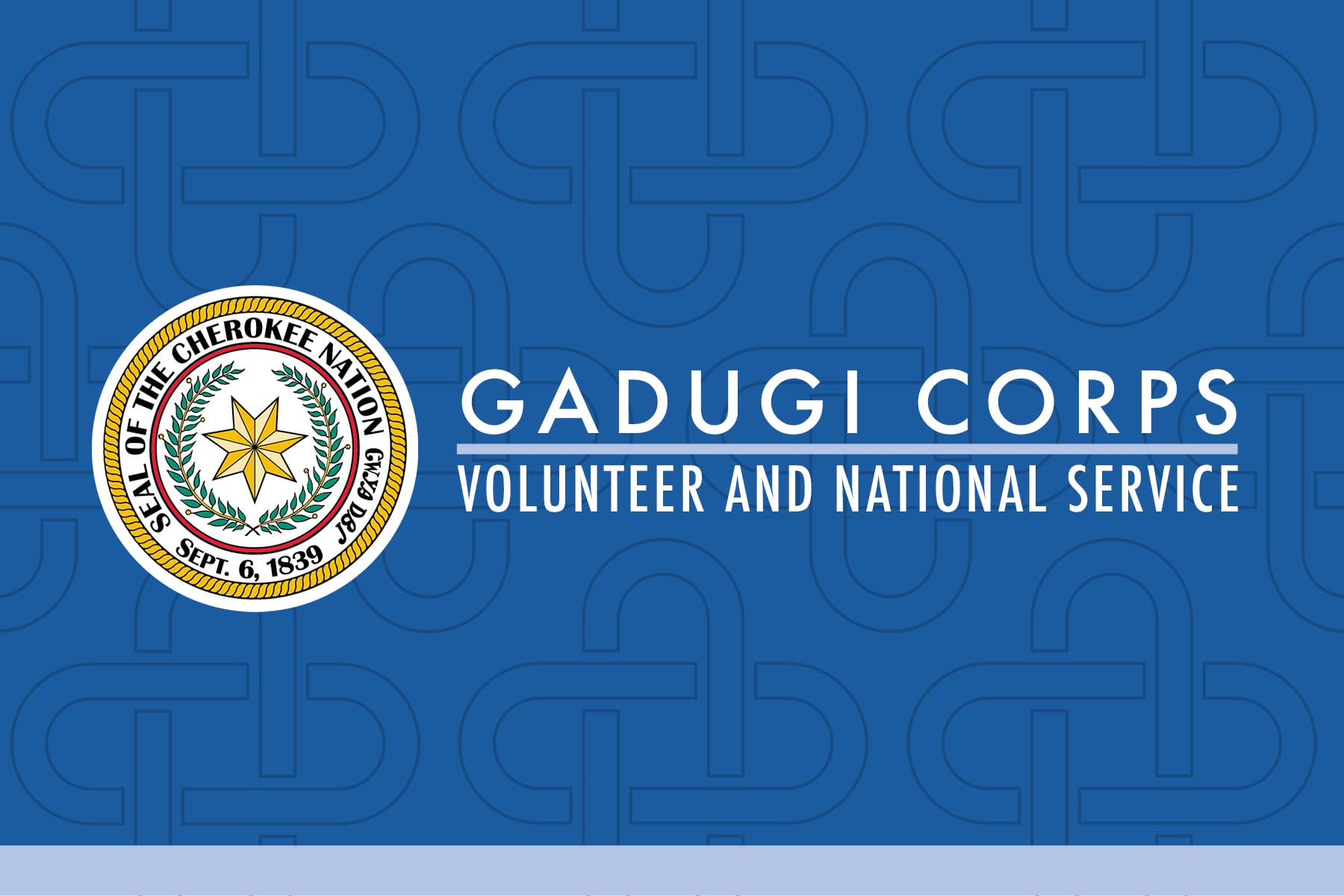
TAHLEQUAH, Okla. — Cherokee Nation Principal Chief Chuck Hoskin Jr. and Deputy Chief Bryan Warner are proposing new legislation to authorize Gadugi Corps, a new volunteer and national service program empowering citizens to improve their communities.
The proposed Gadugi Corps Volunteer and National Service Act of 2023 would authorize up to $3 million annually over four years for the program. Gadugi Corps participants would focus on the following priority areas:
- Supplemental education programs for Cherokee communities and public-school districts with academic deficiencies
- Community-based volunteer and service projects, partnering with non-profit organizations.
- Youth mentorship
- Community disaster and emergency response
- Volunteer and service opportunities for Cherokee citizens living outside the Cherokee Nation Reservation
“Cherokee Nation’s strength has always been at the grassroots,” said Chief Hoskin. “Gadugi, the Cherokee word for ‘working together,’ has always been our central organizing principle and it informs everything we do at Cherokee Nation. Gadugi Corps can harness the spirit of service and volunteerism that is in the heart of every Cherokee.”
By executive order in August, Chief Hoskin established a task force to identify opportunities to increase volunteer and national service opportunities for Cherokee Nation citizens. In his September State of the Nation Address, Chief Hoskin identified Gadugi Corps as a major initiative of his and Deputy Chief Warner’s second term.
Led by former Councilman Shawn Crittenden and Deputy Secretary of State Canaan Duncan, the Gadugi Corps Task Force issued a report in October, laying out an ambitious plan to empower Cherokee citizens and community organizations at the grassroots to focus on local problem solving and community support, plans embraced in the proposed legislation.
Members of the Gadugi Corps Task Force also included cultural advisor Dawni Squirrel, Freedmen Community Liaison Melissa Payne, Chief of Staff Corey Bunch, Language Department employee Kristen Thomas and Education Department employee Shelly Dreadfulwater.
“Gadugi Corps puts structure and resources behind what many Cherokees do every day and what many more are willing to do if they have the support they deserve,” said Deputy Chief Warner.
Crittenden, now a Deputy Executive Director in the tribe’s education department, will oversee Gadugi Corps.
“This is an exciting new program full of possibilities,” said Crittenden. “Obviously when we start any new program it will take a while to reach our full potential, but I expect in year one we can achieve success and build on our success year after year and continue to help our communities through service and volunteerism.”
The proposed law would provide funding for paid national service as well as support for volunteers.
Chief Hoskin and Deputy Chief Warner’s proposal calls for the program to sunset at the end of the 2027 fiscal year, with an opportunity for the Council to reauthorize the program.
One of the legislation’s lead sponsors, Councilor Johnny Jack Kidwell, expressed optimism that the Council will approve it at the December 11 Rules Committee meeting and at the regular full Council meeting scheduled for later that evening.
“The Gadugi Corp legislation includes the types of ideas and initiatives the Council has consistently supported over the years but does so on a larger scale with specific priorities and opportunities for Cherokees on the reservation and at-large to participate,” Councilor Kidwell said.
Oklahoma tribal nations receive roughly $8 million to bolster recycling efforts
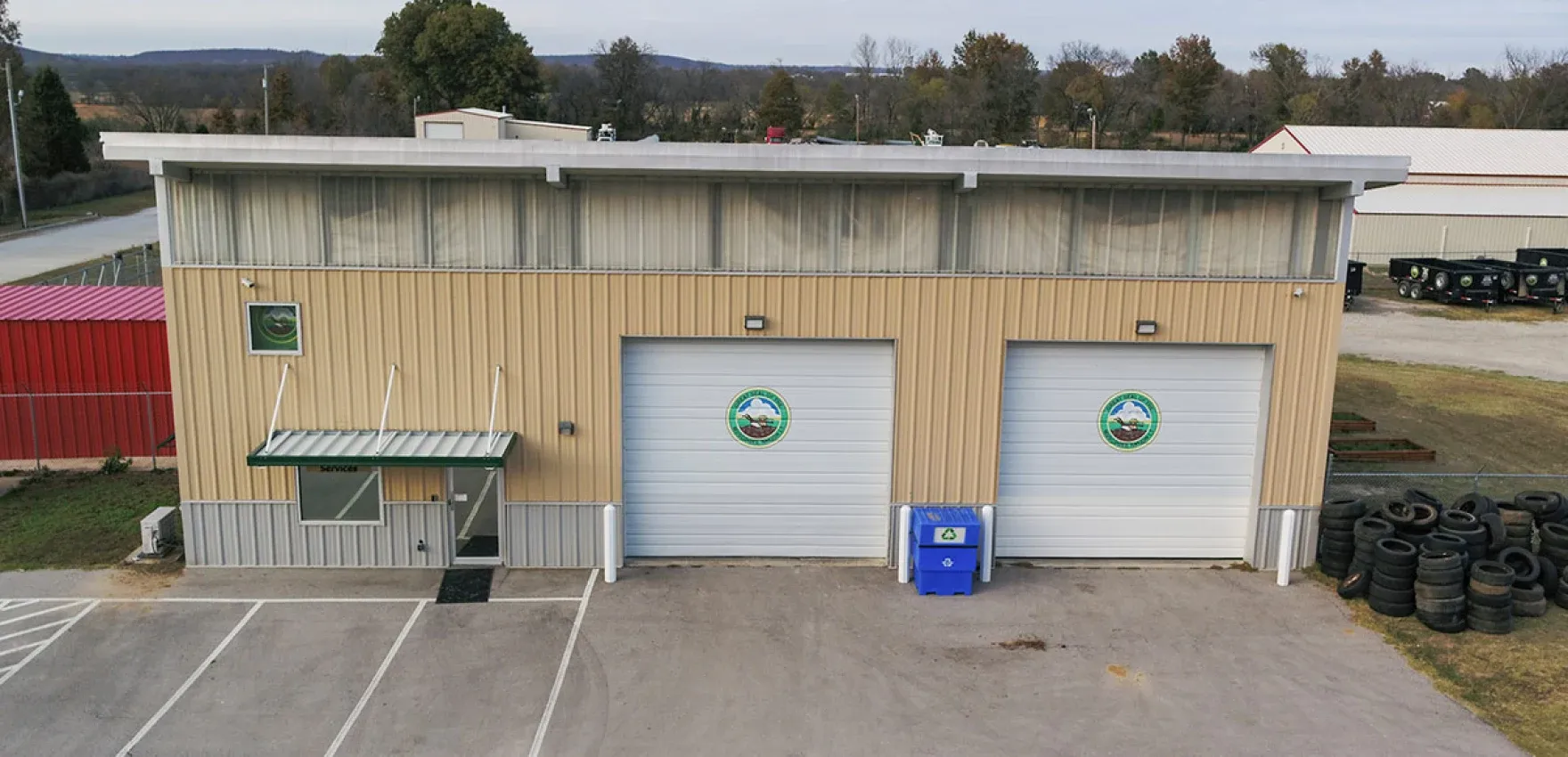
The Environmental Protection Agency is granting more than $8 million dollars to bolster Oklahoma tribal nations' recycling efforts.
KOSU | By Allison Herrera
The efforts vary widely in scope and type.
“The Tribes of Oklahoma are the original stewards of their land, and remain strong protectors of their resources and communities,” said Regional Administrator Dr. Earthea Nance. “With these grants, the Tribes can increase their sustainability and increase capacity for recycling in Tribal homes and businesses.”
The grants will pay for projects conducted by the following tribal nations:
- The Cherokee Nation will get $1,492,425 to pay for infrastructure to better recycle and reuse brush, vegetation and other wood waste from the tribal nation’s landfill.
- The Modoc Nation will get $1,245,786 to improve its efforts to recycle. The nation will hire new employees, buy equipment and eventually establish a new waste management facility.
- The Muscogee Nation will get $906,621 to expand its Solid Waste Post-Consumer Materials Management Program. The nation will buy new solid waste transportation equipment and recycling stations to expand access across its reservation.
- The Wyandotte Nation will get $947,266 to expand and renovate the Lost Creek Recycling Center.
- The United Keetoowah Band will get $2,000,000 for a grant related to recycling education and outreach.
All of these grants are part of President Joe Biden's Investing in America Plan. It is an effort to bolster the EPA’s National Recycling Strategy.
“The Savior” film to be dubbed in the Mvskoke language
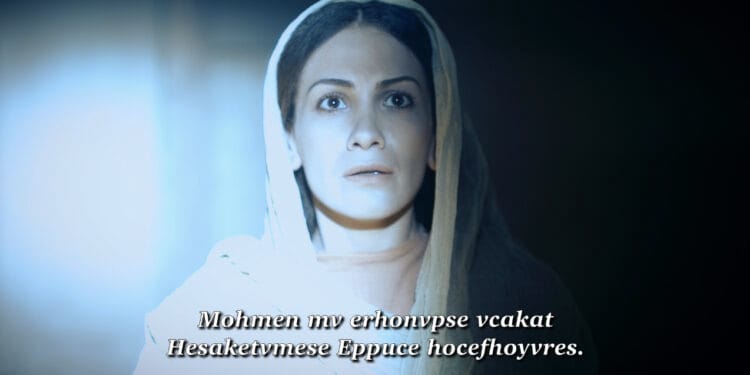
The movie is set to be the first full length feature dubbed in the Mvskoke language
MVSKOKE RESERVATION – A feature length movie based upon the life of Jesus Christ will be getting a Mvskoke cultural connection. Muscogee (Creek) Nation citizen Jennifer Barnett and Oklahoma City-based director Aaron Hanzel (Choctaw/Chickasaw) have been collaborating to dub the movie “The Savior” into the Mvskoke language. When complete, it will not only be the first film to be entirely dubbed in the Mvskoke language, it will also be the first Native North American language used for the film as well.
Premiering in 2014, the movie retells the story of Jesus Christ, from his birth to his death and resurrection. Originally filmed in Arabic, the Bulgarian-Jordanian production has already been dubbed in over 40 languages.
The Mvskoke language project began when Barnett’s father, the late Rev. Bill Barnett, was told about the film in 2017. Barnett explained to Mvskoke Media’s LiveWire, “He’d always wanted to have a film like that in our Muscogee language. And so from there he gathered my uncle Jackson Barnett and several other elders. And when they received the script, they began to translate it. And so Muscogee is the first North American language that will be used for this film. We’re really excited about it.”
Barnett and Hanzel have completed two proof-of-concept videos so far, the Nativity Story and the Easter Story. These smaller-scale, preliminary dubs of sections from the film helped secure funding for voice-over work for the full film.
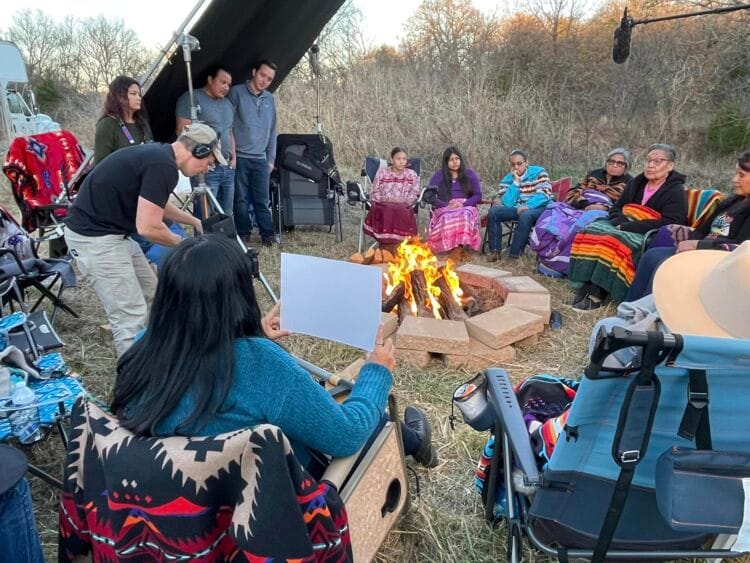
Both can be found on their website, THE SAVIOR in Mvskoke, along with resource materials to support Mvskoke language learning. The resource materials include Christmas and Easter plays in Mvskoke and English, language pronunciation guides, and Mvskoke hymns.
Barnett wants to encourage people to use the proof-of-concept videos, which also include subtitles in English and Mvskoke. Barnett said, “We do offer them with the Muskogee, with the subtitles in Muskogee or even subtitles in English as well. And so we want people, we want churches to use that. And at the same time, we want it to be a tool to help preserve our language and encourage the learning of it.”
Currently, the project is casting for 80 different speaking roles. They are looking for speakers who are proficient to fluent in the Mvskoke language. Barnett explained, “The biggest hurdle right now is casting, we’re trying to get as many people involved with the project as possible. The funding is there…for right now we just need folks to reach out and get involved.”
Additional scenes shot will give an even deeper Mvskoke context to the film. In addition to the voice-over work for the film, Barnett and Hanzel have also added to the original production by recently shooting a few scenes of their own. Filmed at Camp Sooner, the scenes capture a storytelling night around a campfire telling the story in Mvskoke. As was important for Barnett and Hanzel, the additional scenes use Mvskoke people and Mvskoke actors.
Barnett explained, “And we had the idea of like, what if we wrote new scenes? Like what if we added someone telling the story in Mvskoke? And even if it’s as simple as a storytelling night. So we put together a short script and sent it to all the folks that had funded everything so far and they were like, ‘We love it.’”
For information on voice-over work or for those interested in reaching out to Barnett and Hanzel, go to their website THE SAVIOR in Mvskoke, or call 405-595-0053.
